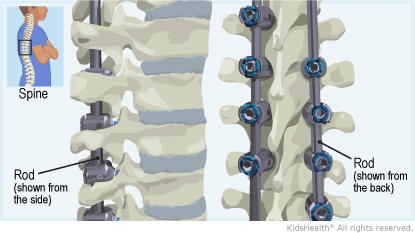Spinal Fusion Surgery
What Is Spinal Fusion Surgery?
Doctors do spinal fusion surgery to help teens with scoliosis or other spine problems.
It's called "fusion" because the surgery lets two or more bones in the spine (called vertebrae) fuse (grow together) into one solid bone. This straightens the spine and prevents the curve from getting worse over time.
Why Is Spinal Fusion Surgery Done?
Many teens with scoliosis don't need medical treatment. Others will wear a brace to keep the spine from developing more of a curve.
But someone might need surgery if:
- Their curve is too large for bracing.
- They're too old and their spine has finished growing.
- They have a type of scoliosis that can't be helped with a brace.
In that case, a spinal fusion might be needed to straighten the curve as much as possible and stop it from getting worse.
What Happens During Spinal Fusion Surgery?

If you have a spinal fusion, you'll get general anesthesia before the procedure. This lets you sleep through the operation, which takes several hours.
- After making an incision (cut) in the back, the surgeon makes cuts in the bone to put it in a straighter position.
- Then, the surgeon puts in rods and screws to hold the bone in that straighter position. The metal parts are placed deep under the spine muscles. In most cases they can't be felt and don't hurt.
- Finally, the surgeon packs in bone graft (small pieces of bone) where the rods and screws are. This will eventually fuse the spine bones together.
What Happens After Spinal Fusion Surgery?
After a fusion, most teens stay in the hospital for a couple of days while they recover from surgery and increase their movement. By the time you go home, you'll be able to walk around and do many day-to-day things (shower, dress yourself, and climb stairs).
Someone whose scoliosis is very severe or who has other medical conditions might need a longer hospital stay. The care team will watch for and treat any complications (such as pneumonia, constipation, or trouble eating).
Pain after surgery is treated with over-the-counter (OTC) or prescription medicines. Most teens take prescription medicine for less than 2 weeks to help with pain and muscle spasms. Over the next few weeks, they can take less pain medicine.
What Should I Do After Spinal Fusion Surgery?
While you recover at home:
- Try to walk or move around a little bit more each day. Start with light activity around the house, like going to get the mail or letting the dog out. Soon, you'll be able to get out of the house to do normal, everyday activities like walking around the mall or going out to eat.
- Don't drive or lift more than a few pounds until the health care provider says it's OK.
Your health care provider also will let you know when you can go back to school. Most teens go back about 2–3 weeks after the surgery. Your provider will review specific activity restrictions after surgery. You'll need to take a break from gym class and playing sports because the bones are still fusing. Let your teachers know if you'll need help at first, such as extra time to get through the hallways or a second set of schoolbooks to keep at home.
Sometimes teens will need physical therapy to complete their recovery. This usually starts about 4–6 weeks after surgery, and can continue for several months.
What Else Should I Know?
After about 6 months to a year, the bones should be fully fused. Although the metal rods are no longer needed, they'll be left in your back because they aren't doing any harm and taking them out would involve another operation.
After a full recovery, you can play sports again and do all the activities that you enjoyed before surgery.
Reviewed by: Suken A. Shah, MD, Bernadette Fulweiler, APN
Date Reviewed: Jan 15, 2022
















